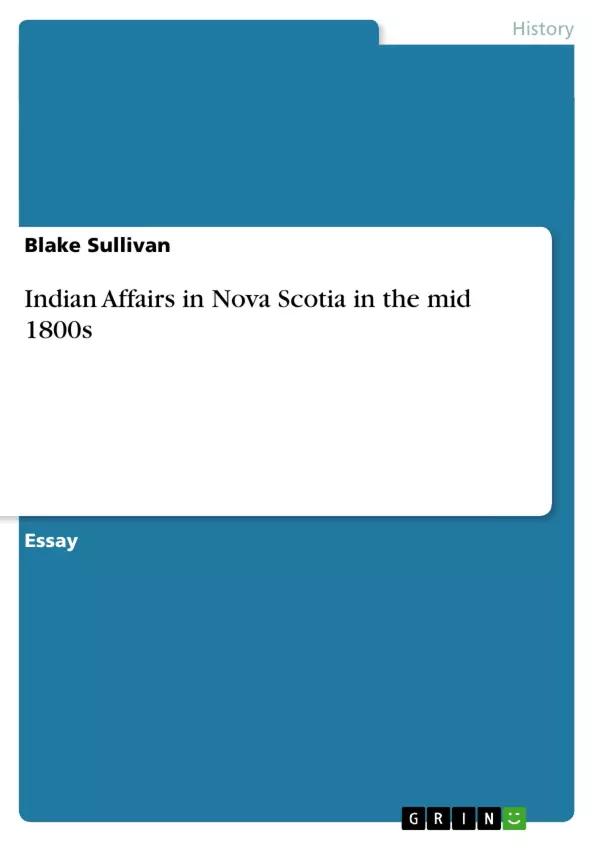The following essay presents a short introduction about the Indian Affairs in Nova Scotia in the mid 1800s.
Inhaltsverzeichnis (Table of Contents)
- Introduction
- The Mi'kmaq Population Decline
- Land Crisis and Discrimination
- Education and Cultural Transformation
- Conclusion
Zielsetzung und Themenschwerpunkte (Objectives and Key Themes)
This report explores the work of Joseph Howe, Commissioner of Indian Affairs in Nova Scotia in the mid-1800s, and his efforts to improve the lives of the Mi'kmaq people. Howe's "Report on Indian Affairs" provides insight into the challenges faced by the Mi'kmaq during this period, including population decline, land loss, and cultural assimilation.
- The impact of European settlement on the Mi'kmaq population
- Land ownership and discrimination against Mi'kmaq people
- The importance of education for cultural transformation
- Howe's advocacy for the Mi'kmaq people
Zusammenfassung der Kapitel (Chapter Summaries)
- Introduction: This chapter introduces Joseph Howe and his role as Commissioner of Indian Affairs in Nova Scotia. It highlights the context of the report, which was written during a time when First Nations people were not well-represented by the government.
- The Mi'kmaq Population Decline: Howe expresses concern over the declining Mi'kmaq population due to the influx of European settlers. He acknowledges the government's lack of support for the Mi'kmaq and emphasizes the importance of protecting their well-being.
- Land Crisis and Discrimination: This chapter explores the challenges faced by the Mi'kmaq in terms of land ownership. Howe highlights the discriminatory practices of the government and the lack of quality land allocated to the Mi'kmaq. He also discusses his efforts to protect their land rights.
- Education and Cultural Transformation: Howe's report emphasizes the significance of education for the Mi'kmaq people. He recognizes their resistance to formal education but stresses its role in cultural transformation and advancement.
Schlüsselwörter (Keywords)
This report focuses on key concepts including: Mi'kmaq history, European colonization, Indigenous land rights, cultural assimilation, and the role of education in social change. It analyzes the work of Joseph Howe as Commissioner of Indian Affairs in Nova Scotia and his efforts to improve the conditions of the Mi'kmaq people during a period of significant societal and political transformation.
Frequently Asked Questions
Who was Joseph Howe in the context of Nova Scotia history?
Joseph Howe was a prominent Nova Scotian politician who served as the Commissioner of Indian Affairs in the mid-1800s. He is known for his advocacy and reports on the conditions of the Mi'kmaq people.
What were the main challenges faced by the Mi'kmaq in the mid-1800s?
The Mi'kmaq faced a significant population decline due to European settlement, loss of traditional lands, discrimination in land ownership, and pressure for cultural assimilation.
How did European settlement impact the Mi'kmaq population?
The influx of settlers led to the displacement of Indigenous communities, competition for resources, and the introduction of diseases, all of which contributed to a decline in the Mi'kmaq population.
What was Joseph Howe's stance on education for the Mi'kmaq?
Howe believed that education was essential for the cultural transformation and social advancement of the Mi'kmaq people, although he recognized their resistance to formal European-style schooling.
Why was the land crisis so significant for the Mi'kmaq?
The government often allocated poor-quality land to the Mi'kmaq and failed to protect their rights against encroaching settlers, leading to economic hardship and the loss of their traditional way of life.
- Citation du texte
- Blake Sullivan (Auteur), 2013, Indian Affairs in Nova Scotia in the mid 1800s, Munich, GRIN Verlag, https://www.grin.com/document/285191



